Whether the Obama administration has ushered in a new era when it comes to the federal government and medical marijuana is arguable. One thing that isn't is that victims of Clinton and Bush era raids remain behind bars or facing prosecution. There are beginning to be moves afoot to right that lingering wrong.
The House has passed a measure that would end the federal ban on funding needle exchange programs, but it includes a provision barring them from operating within a thousand feet or schools, parks, and other public places. Advocates are working to ensure that a good bill comes out of the House-Senate conference committee at the end of the appropriations process.
Another week, another grim death toll in Mexico. September was the bloodiest month this year.
Do you read Drug War Chronicle? If so, we need your feedback to evaluate our work and make the case for Drug War Chronicle to funders. We need donations too.
Cops busted for testilying, a deputy arrested for demanding a bribe from a pot grower, a jail guard arrested for smuggling pot into the prison, and a Michigan town still doesn't know who stole drug buy money from the police department.
As many as 1,500 Rockefeller drug law prisoners could walk out of prison early after reforms passed in April went into effect this week. But that still leaves 12,000 more behind bars in the Empire State.
All of the attention has been on California, but it's Massachusetts where the state legislature will hold a hearing on a marijuana legalization bill next week.
Global Marijuana March organizer Dana Beal and two friends are in hot water after being busted while heading east through Nebraska last week.
First, the Texas DA collaborated in a racially discriminatory and lawless asset forfeiture rip-off scheme directed at innocent motorists. Now, facing a civil lawsuit, she wants to use the very money she helped rip-off to pay for her defense. The ACLU has cried foul.
The Obama administration earlier this year gave up the delusion that eradication of poppy crops was a viable response to widespread Afghan opium production. But now the Russians, with soaring addiction rates because of Afghan heroin, are urging that the poppy fields be sprayed.
Marijuana production and consumption has been a bone of contention in the South Pacific island republic of Fiji for years. Now, some comments from a leading NGO are heating up the controversy again.
Events and quotes of note from this week's drug policy events of years past.
Every two years drug policy reformers from across the United States and around the world come to the International Drug Policy Reform Conference to listen, learn, network and strategize together for change. This year the conference is in Albuquerque, in November, and StoptheDrugWar.org is a partner.
"Drug Czar's Office Reevaluating Marijuana Policy: 'We're trying to base stuff on the facts,'" "Washington Post Punches Marijuana Prohibition in the Teeth," "Irony Alert: Drug Czar Complains About Media Bias," "A Lesson in Etiquette for Drug Policy Activists," "1000 Feet from Everywhere," "Hearings on Massachusetts 'Tax and Regulate' Bill in Boston Next Week," "New York Rockefeller Drug Law Reforms Go Into Effect Today."
Apply for an internship at DRCNet and you could spend a semester fighting the good fight!
When Attorney General Eric Holder announced back in March that he would not use Justice Department resources to go after medical marijuana patients and providers in states where it is legal unless they were violating both state and federal laws, he ushered in a new era in the battle over medical marijuana. Since then, the number of DEA raids on providers has dwindled -- if not quite down to zero, still a dramatic improvement over the last years of the Bush administration.

Naulls family (courtesy green-aid.com)
Still, while the pace of raids and prosecutions has declined, the raids continue. There have been at least a dozen raids where federal law enforcement was present since the Obama administration took power.
But even in this arguably new era, there is left-over business to take care of from the Bush days, and some from the Clinton days. Medical marijuana providers convicted under federal drug laws remain imprisoned. Medical marijuana providers raided, but not yet charged, have the specter of federal prosecution hanging over them. Medical marijuana providers arrested on federal drug charges remain subject to prosecution. And hold-over US Attorneys from the Bush era continue to prosecute them. Another Bush administration hold-over, Michelle Leonhart, remains in charge at DEA.
According to the medical marijuana defense group Americans for Safe Access (ASA), at least 130 medical marijuana patients and providers are being prosecuted, or have been prosecuted or convicted under federal drug laws. ASA also lists 10 medical marijuana providers currently in federal prison. That list does not include an 11th person, Eddy Lepp, who is now serving a mandatory minimum 10-year prison term, because Lepp defended himself with a religious freedom defense, even though he was growing for medicinal reasons.
Some of the victims of the federal campaign are well known, such as "Guru of Ganja" Ed Rosenthal, who was prosecuted over a permitted grow in Oakland; Dr. Mollie Fry and her partner, Dale Shafer, who were sentenced to serve time in federal prison; Eddy Lepp; and Bryan Epis, the first medical marijuana provider prosecuted by the feds, who served two years of a mandatory minimum 10-year prison sentence before being released on appeal. (Epis has created petitions seeking justice for himself and other medical marijuana martyrs; you can view them here.)
Others are lesser known, but equally deserving of justice -- Ronnie Naulls, for example. Naulls operated a permitted dispensary in Corona, California and paid his taxes, but still got raided and arrested under federal law. Authorities turned his three children over to California Child Protection Services, and his wife was forced to plead guilty to a felony child endangerment count or face federal charges because the couple had marijuana in their home. The couple got their kids back, but Naulls faces a preliminary hearing next week.
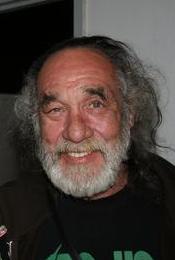
Eddy Lepp, at sandiegomarijuana.com event (myspace.com/williamwwest
Or
Dustin Costa. A medical marijuana patient and provider and head of the Merced Patients Groups, Costa was arrested on state charges by Merced County sheriff's deputies in March 2004. After a year and a half of state court proceedings, the Merced District Attorney turned his case over to the feds. Costa was convicted of federal charges of cultivation, possession with intent to distribute, and possession of a firearm. He's now three years into a 13-year sentence, which he is serving at the federal prison in Big Springs, Texas.
Or the multiple people arrested in the San Francisco Sunset dispensary raids in 2005 and the San Diego dispensary raids in 2006. The former netted 33 people, the latter six. All still face federal prosecution.
"We have seen a continuation of the prosecutions that began under Bush," said ASA spokesman Kris Hermes. "This is unfortunate given that they've signaled a change in federal policy. Nor is there any evidence they will pardon or commute sentences or stop prosecuting those people indicted under Bush but who have not yet completed the prosecutorial process."
"What needs to be done is that the Justice Department should review all those cases in light of current policy and rethink the pending prosecutions of those people who would have been left alone based on the policy now being enforced," said Bruce Mirken, communications director for the Marijuana Policy Project. "I am sure there are at least some whose actions appear legal under state law. It would be nice to see those folks left alone and no further tax dollars wasted persecuting them. It would also be nice to see the use of presidential pardon power in those cases who would not be prosecuted now have already been sentenced and are sitting in federal prison."
But Mirken isn't holding his breath. "I wish I thought that was going to happen immediately, but Obama's saving his political capital for other stuff," he said.
One key to seeing real change from the federal government is getting real change in the federal government. With Bush appointees still in place at DEA and in the US Attorney positions, the Bush era prosecutions continue, and so do the raids.
"Obama is really behind on that," said Dale Gieringer, director of California NORML. "As I recall, Bush appointed Asa Hutchinson DEA director in August 2001, and here we are in October of Obama's first year and there's still a Bush appointee there. I recall very specifically that we saw the first raids orchestrated by US Attorneys within a couple of weeks of 9/11. That's when they went after Dr. Molly Fry and the Los Angeles Cannabis Resource Center. It only took until September of his first year for Bush to have an aggressive new team in place, but so far under Obama, we have nobody new at DEA and no new US Attorneys. In Northern California, the US Attorney is still the same guy who was appointed by Reagan. The rate of change is disappointing," Gieringer said.
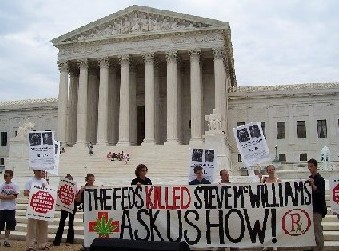
July 2005 protest in Washington after suicide of Steve McWilliams, San Diego medical marijuana provider who was facing federal prosecution
"The fact that a new head of DEA and new US Attorneys have not been appointed may present a problem in establishing a new policy on medical marijuana," said Hermes. "In at least a half dozen cases currently being prosecuted, the federal judges have asked for clarification on the administration's new policy before they proceed. That federal judges are balking at these continuing prosecutions in light of the supposed new policy from the Obama administration ought to be a concern to the administration. But what they're getting in response from the administration is not hopeful. The Department of Justice is saying it sees no reason to discontinue these cases or move them to state court."
State court is where these medical marijuana cases belong, said the ASA spokesman. "Our position is that the federal government doesn't need to prosecute any medical marijuana cases in federal court," said Hermes. "If they think there is a violation of state law, they should leave it up to the state courts to adjudicate that. As long as they're in federal court, the government won't be debating whether the defendants were in compliance with state law -- they don't even have to address that, and they won't, because it would hinder their chances of obtaining convictions. There is no role for the Justice Department in prosecuting state law violation medical marijuana cases in federal court," Hermes argued.
For those already convicted, it's too late for state court. The only relief they are even remotely likely to see is a presidential pardon or commutation.
"I have this goal of getting Eddy Lepp out before his sentence expires," said Gieringer. "But to get out prison, you have to apply for a pardon. My understanding is it's sort of up to the prisoners and their attorneys to get that together. I don't know that anyone has started on that project yet."
Not yet, but it looks like one is in the works. "We're looking at mounting a campaign to win pardons for those people currently serving federal sentences," said Hermes, noting that some of them are doing as many as 20 years.
But don't count on the Obama administration to take the initiative, said Gieringer. "We're in a period of benign neglect," he said. "Obama is weaker now and less interested in these issues. He's not inclined to do anything, unlike Bush, who was forceful and assertive in the wrong directions. Now, there's a different dynamic going on. We're going to have to push as hard as we can, and hopefully we can get Obama's attention."
In the meantime, some nonviolent medical marijuana patients and providers rot in federal prison, others are having to continue to fight their federal prosecutions, and even more -- those raided but never (not yet) charged -- possibly face the same fate. We won't be to a new era until we take care of this old business.
back to top
Years of effort by harm reductionists, public health authorities, HIV/AIDS researchers and activists, and drug law reformers to undo the more than 20-year-old ban on federal funding for needle exchange programs (NEPs) may come to fruition this year, but there are significant obstacles to overcome. Still, advocates of the reform are cautiously optimistic.
Since 1988, the US government has prevented local and state public health authorities from using federal funds for NEPs, which studies have shown to be effective in reducing HIV infection rates among injection drug users (IDUs) and their sexual partners, promoting public health and safety by taking syringes off the streets, and protecting law enforcement personnel from injuries. NEPS have been endorsed by the World Health Organization, the American Medical Association, Centers for Disease Control and Prevention Director Thomas Frieden, and former Surgeons General Everett Koop and David Satcher, among many others.
|
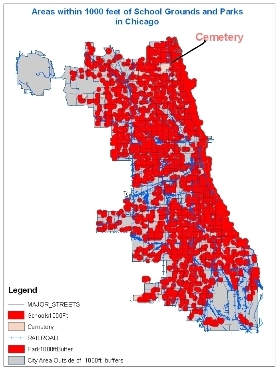
Chicago map demonstrating the impact of the
1000-foot rule -- click for larger copies and more
maps of Chicago and San Francisco (courtesy
Dr.Russell Barbour, Center for Interdisciplinary
Research on AIDS, Yale School of Medicine) |
Injection drug use accounts for up to 16% of the 56,000 new HIV infections in the US every year -- or nearly 9,000 people. IDUs represent 20% of the more than 1 million people living with HIV/AIDS in the US and the majority of the 3.2 million Americans living with hepatitis C infection.
Still, those numbers could have been higher. In a 2008 study, the CDC concluded that the incidence of HIV among injection drug users had decreased by 80% in the past 20 years, in part due to needle exchange programs. There are today an estimated 185 NEPs operating in 36 states, the District of Columbia, and Puerto Rico. But they rely on local or private funds, and many of them are failing to meet demand because of lack of funding. While the CDC says that its public health policy goal is 100% needle exchange, current estimates are that only 3.2% of needles used by drug users in urban areas are exchanged for clean ones.
The federal funding ban was first removed in a July 10 vote of the House Subcommittee on Labor, Health and Human Services, Education, and Related Agencies. A week later, the full Appropriations Committee approved the bill after voting down an amendment proposed by US Rep. Chet Edwards (D-TX) that would have reinstated the funding ban.
But the Appropriations Committee did approve an amendment dictating that federally funded NEPs could not operate "within 1,000 feet of a public or private day care center, elementary school, vocational school, secondary school, college, junior college, or university, or any public swimming pool, park, playground, video arcade, or youth center, or an event sponsored by any such entity."
A floor amendment by Rep. Mark Souder (R-IN) to reinstate the funding ban also was defeated, clearing the way for repeal of the ban to pass the House. But the thousand-foot language remains in the appropriations bill approved by the House, and it's extremely objectionable to reform advocates. The Senate committee working on the issue did not include ending the funding ban, but reform advocates are pinning their hopes on both ending the ban and killing the thousand-foot restriction on the end-game House-Senate appropriations conference committee.
"The Senate has taken up their version of the bill in committee, but hasn't had a full vote," explained Daniel Raymond, policy director for the Harm Reduction Coalition. "At the committee level, the Senate chose not to take any action on the ban. At this point, there is a conflict between the House and the Senate." HRC is lobbying the Senate to repeal the ban, without the restrictions.
"We commend the full House for recognizing that NEPs are essential, effective tools that work in our fight against HIV and hepatitis transmission," said Kevin Robert Frost, chief executive of the Foundation for AIDS Research. "And while the compromise in the bill isn't perfect, we are hopeful that a final bill will reach President Obama's desk without limitations."
"We urge Congress to recognize both the benefit and cost-savings of syringe exchange programs, and the research that NEPs do not have detrimental impact on communities," said Marjorie Hill of Gay Men's Health Crisis, which has just released yet another study demonstrating NEPs' effectiveness in decreasing the transmission of blood-borne diseases. "For too long, we have allowed ideology to drive public health policy. It is time to remove the federal funds ban for syringe exchange and remove the harmful 1,000 feet restriction," added Hill.
"The House bill, as it stands, still puts ideology before science by limiting how federal funds can be used for NEPs," Frost said. "But we have time to fix the legislation, and I'm hopeful that the full US Congress will realize the importance of allowing local elected and public health officials to make their own decisions about how to address their HIV and hepatitis epidemics."
"I believe that the president, the Senate, and the House all want to do the right thing and they're trying to figure out how to do it," said Bill McColl of AIDS Action. "If they follow their own rhetoric about science- and evidence-based HIV/AIDS prevention policy, then they will remove the thousand-foot restriction," he said.
"The thousand-foot provision is a backdoor means of reinstating the funding ban," McColl continued. "There is almost no urban environment in which it would allow needle exchanges to operate. There are no currently existing needle exchanges that would be able to get federal funding, so it just doesn't make sense to change the policy that way. Drug policy groups have gone and literally shown Congress maps of what would be excluded. They've got letters from mayors and police saying this is not a workable provision. Again, Congress and the president know what the science is."
In addition to eliminating federally-funded needle exchanges in vast swathes of the urban landscape, the thousand-foot rule would have other insidious effects, said McColl. "Having that rule would have undesirable side effects, in that it would separate needle exchange from other public health services. Our AIDS program does testing in areas with lots of drug use -- that's where we need to be testing, and that's where we want the population to have clean syringes. With federal funding available and with the thousand-foot rule, prevention services will be driven away from needle exchanges."
Alice Bell, prevention project coordinator for Prevention Point Pittsburgh, already lives with geographical restrictions. "We have a local regulation that specifies 1,500 feet from schools only, not all the other restrictions in the current language of the federal bill. We have to move our main needle exchange site because the building we're in is being sold, and we're having trouble finding a good place. Any federal restrictions would make it even tougher," she said.
Bell wants the federal funding ban ended, but worries that the thousand-foot rule would put a crimp in her efforts. "We still want it. We need the federal funding. Our program is expanding, but we can't really expand our exchange service because we don't have money for needles. The toughest thing is always getting money for needles. Ending the federal funding ban would make a huge difference to us."
Federal funding becomes even more significant when coupled with economic hard times and budget problems at the state and local level, Bell noted. "We're mostly funded through foundations and private donations, and we've begun getting some state and county money for overdose prevention and HIV prevention, but the needle exchange -- the core of what we do -- is the toughest to get funded."
"The Senate will most likely go along with the House in conference committee," said Drug Policy Alliance director of national affairs Bill Piper. "They will probably take a bunch of appropriations bills and put them in a massive omnibus spending bill. It is far from clear that there will be a ban in what comes out of the Congress."
But the thousand-foot rule has to go, he said. "A lot of groups have been lobbying really hard on the thousand-foot issue," Piper noted. "It would be an effective ban is many cities. Here in DC, for example, the only place you could do a needle exchange program would be down at the docks on the Potomac. The strategy is to convince the conference committee to either take that out or come up with something better."
Advocates are lobbying hard right now, said the Harm Reduction Coalition's Raymond. "Right now, we're doing a push to make sure the Senate is educated about the issue and ask the leadership to get on board with House's action to address the ban," he said. "The House version has the thousand-foot restriction, so we're also making the arguments about why that's not workable and needs to be redone. We've been circulating maps showing its impact to House members who are focused on the issue. This restriction goes far beyond any reasonable desire to balance public health with other interests. When that provision was thrown in at the last minute, its effects hadn't really been thought out," he argued.
"We keep up the work in reaching out to Congress on both House and Senate side," said Raymond, "and we're also asking the White House to show some leadership and urge the Senate to address the federal ban. We don't want this issue to get lost in the shuffle, we're calling on everyone in the community to make our voices heard and reaching out to our elected officials."
It may take awhile to get settled, said Piper. "The entire appropriations process is messed up, and a lot of will depend on if, when, and how the Senate deals with health care," he explained. "Supposedly, they will get the appropriations bills done by the end of October, but I think that's a fantasy. Last year, they didn't even do this year's appropriations bills until March."
Still, AIDS Action's McColl maintains a positive outlook. "I think the members who will be called on to vote on this understand the issues," he said. "I have a pretty good feeling about this. I'm hopeful this is the year."
back to top
by Bernd Debusmann, Jr.
Mexican drug trafficking organizations make billions each year trafficking illegal drugs into the United States, profiting enormously from the prohibitionist drug policies of the US government. Since Mexican president Felipe Calderon took office in December 2006 and called the armed forces into the fight against the so-called cartels, prohibition-related violence has killed over 12,000 people, with a death toll of over 5,000 so far in 2009. The increasing militarization of the drug war and the arrest of several high-profile drug traffickers have failed to stem the flow of drugs -- or the violence -- whatsoever. The Merida initiative, which provides $1.4 billion over three years for the US to assist the Mexican government with training, equipment and intelligence, has so far failed to make a difference. Here are a few of the latest developments in Mexico's drug war:

shrine to San Malverde, patron saint of the narcos (and others), Culiacán -- plaque thanking God, the Virgin of Guadalupe, and San Malverde for keeping the roads cleans -- from ''the indigenous people from Angostura to Arizona''
In Tijuana, three municipal policemen were killed after being attacked by suspected cartel gunmen. The three men were riding in two pickup trucks when they were ambushed. Two others were wounded. In the past, Tijuana-based drug trafficking organizations have targeted members of the policemen at random, in what is thought to possibly be an attempt to force high-ranking police officials to resign.
Thursday, October 1
According to a tally being kept up by El Universal September has (so far) been the most violent month of 2009 in Mexico. Some 757 drug-trafficking related homicides were committed in 2009. Of these, 360 occurred in Chihuahua (which includes Ciudad Juarez), 112 in Sinaloa, 74 in Durango, and 55 in Guerrero, with smaller numbers in other areas of Mexico. On the last day of September, 22 people were killed across the country, including several policemen. 12 of these killings occurred in Ciudad Juarez.
Friday, October 2
A federal investigation found that guns purchased in the Houston area were used in at least 55 murders on the Mexican side of the border. All the killings were linked to one particular cell of the Gulf Cartel, and the dead included Mexican police, civilians, and drug traffickers. The federal government contends that Houston is the top spot in the US for the purchase of weapons later used in drug-related murders in Mexico.
During one 24 hour period, nine policemen were murdered in several incidents across the country. Among these were two in Guerrero, were two policemen were ambushed. One of them was found dead by the roadside, while another was kidnapped (and his squad car taken) and later found dead. In Sonora, a policeman was kidnapped by a group of armed men and later found dead in an empty lot. In addition to the killings of the policemen across the country, 13 people were killed in Ciudad Juarez and 7 in other parts of the country.
Saturday, October 3
Mexican authorities seized a record 37 tons of precursor chemical used in the production of methamphetamine. The drug seizure was the result of two separate raids. Twenty tons were intercepted at the Pacific port of Manzanillo, and 17 tons were taken at a customs post in Nuevo Laredo, on the border with Texas.
While public safety and law enforcement officers were meeting in Guanajuato to discuss ways to fight organized crime, 10 people were gunned down in various parts of the state. Local officials believe that at least seven of the killings can be linked together, and all ten are thought to be part of a turf battle between different drug trafficking groups fighting over the area.
Monday, October 5
In Ciudad Juarez, period five men were killed when gunmen burst into a bar and opened fire. Four people were gunned down at the same bar six months ago.
Tuesday, October 6
Seven men were killed after being attacked by a group of armed men near the Guatemalan border in the state of Chiapas. Large quantities of cocaine are thought to transit through the Guatemalan-Mexican border on their way to the US border from South America.
At Mexico City International Airport, a woman was arrested carrying seven kilos of cocaine. The woman, a Mexican citizen, was caught after being searched by airport security personnel. She was also carrying nearly 15,000 pesos and $525 -- a total of less than $650.
Total body count for the week: 226
Total body count for the year: 5,637
Read the last Mexico Drug War Update here.
back to top
Do you read Drug War Chronicle? If so, we'd like to hear from you. DRCNet needs two things:
- We are in between newsletter grants, and that makes our need for donations more pressing. Drug War Chronicle is free to read but not to produce! Click here to make a donation by credit card or PayPal, or to print out a form to send in by mail.
- Please send quotes and reports on how you put our flow of information to work, for use in upcoming grant proposals and letters to funders or potential funders. Do you use DRCNet as a source for public speaking? For letters to the editor? Helping you talk to friends or associates about the issue? Research? For your own edification? Have you changed your mind about any aspects of drug policy since subscribing, or inspired you to get involved in the cause? Do you reprint or repost portions of our bulletins on other lists or in other newsletters? Do you have any criticisms or complaints, or suggestions? We want to hear those too. Please send your response -- one or two sentences would be fine; more is great, too -- email [email protected] or reply to a Chronicle email or use our online comment form. Please let us know if we may reprint your comments, and if so, if we may include your name or if you wish to remain anonymous. IMPORTANT: Even if you have given us this kind of feedback before, we could use your updated feedback now too -- we need to hear from you!
Again, please help us keep Drug War Chronicle alive at this important time! Click here to make a donation online, or send your check or money order to: DRCNet, P.O. Box 18402, Washington, DC 20036. Make your check payable to DRCNet Foundation to make a tax-deductible donation for Drug War Chronicle -- remember if you select one of our member premium gifts that will reduce the portion of your donation that is tax-deductible -- or make a non-deductible donation for our lobbying work -- online or check payable to Drug Reform Coordination Network, same address. We can also accept contributions of stock -- email [email protected] for the necessary info.
back to top
Cops busted for testilying, a deputy arrested for demanding a bribe from a pot grower, a jail guard arrested for smuggling pot into the prison, and a Michigan town still doesn't know who stole drug buy money from the police department. Let's get to it:
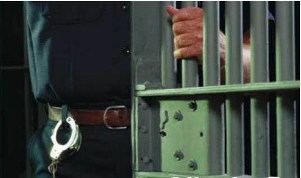
If we can't keep drugs out of the prisons, how can we keep them out of the country?
In Los Angeles,
three LAPD officers were charged Wednesday with lying under oath in a drug possession case that was dismissed last year after a videotape contradicted their testimony. Officers Richard Amio and Even Samuel testified that they chased a man into an apartment building and saw him throw away a black object. They testified that Samuel picked it up and found $260 worth of powder and crack cocaine in it. But videotape from the apartment building showed the officers searching for more than 20 minutes before producing their "evidence." A third officer, Manuel Ortiz, also testified about the case at a preliminary hearing. The judge in the drug possession case dropped the charges against the defendant at prosecutors' request. The three officers all face perjury and conspiracy charges.
In Lebanon, Ohio, a Lebanon Correctional Institution guard was arrested last Friday on charges he was trying to bring drugs into the prison. Guard Dennis O'Rourke, 25, was arrested by state troopers as he met his contact to pick up marijuana. He is charged with attempting to convey drugs onto the grounds of a detention facility, a third-degree felony, and child endangerment, a first-degree misdemeanor, because he had his two-year-old daughter with him during the drug transaction.
In Fort Lauderdale, Florida, a Broward County sheriff's deputy was arrested last Friday for accepting money from a marijuana grower not to arrest him. Deputy Manuel Silva, a nine-year department veteran, allegedly showed up at the grow house last week in plain clothes, but carrying a badge and a gun. He was arrested after picking up an unspecified amount of cash. Silva went down after the grower told someone else about the incident, who in turn went to the authorities. He is now charged with burglary, armed extortion, and drug possession -- he happened to be carrying some oxycodone not prescribed to him when he was arrested. No word on what happened to the grower.
In Troy, Michigan, Troy police still can't find $40,000 that went missing from a police safe in January. The money was earmarked for narcotics investigations. The Oakland County Sheriff's Department has not closed its investigation, but admits it is at a standstill. The Troy police say they have changed policies and procedures regarding funds and restricted the amount of cash on hand for special investigations.
back to top
As many as 1,500 low-level, nonviolent drug offenders will be able to apply for release or shorter sentences under reforms to New York's draconian Rockefeller drug laws that went into effect Wednesday. The partial reforms also mean increased judicial discretion in sentencing, allowing judges to send some offenders to treatment instead of prison.

June 2003 ''Countdown to Fairness'' rally, NYC (15yearstolife.com)
The reforms were signed into law in April by Gov. David Paterson (D) after he and the state legislature came to agreement on the issue. They build on earlier partial reforms passed in 2004 that addressed the lengthy sentences assigned to more serious drug offenders.
"Under the Rockefeller Drug Laws, we did not treat the people who were addicted. We locked them up," Paterson said Wednesday at the Brooklyn Court House. "Families were broken, money was wasted, and we continued to wrestle with a statewide drug problem. The reforms that take effect today address those problems. By returning judicial discretion to the courtroom, we are reuniting families and fighting criminal activity and addiction in our communities," he said.
Because the reforms eliminate some mandatory minimum sentences and allow judges to order eligible defendants to treatment or diversion over prosecutorial objections, the State District Attorneys Association opposed the reforms. But they were championed by a formidable Drop the Rock coalition of drug policy, criminal justice, social justice, and other groups calling for repeal of the Rockefeller laws, as well as by the now Democrat-controlled legislature and statehouse.
"As someone who spent 12 years behind bars on Rockefeller charges and another 12 fighting the inhumane laws, I am thrilled that the law has been changed," said Anthony Papa, author of 15 Years to Life. "But, Rockefeller will only be real when those who are behind bars are allowed to come home and those who need help get treatment instead of a jail cell."
"New Yorkers fought for decades to reform the draconian Rockefeller drug laws, and we finally succeeded this year," said Gabriel Sayegh of the Drug Policy Alliance. "Now we need to make Rockefeller reform work. Today marks another step towards our state moving in new direction on drug policy, one based on public health and safety. Thankfully, legal and human service agencies are stepping up to implement reform."
"Rockefeller Drug Law reform symbolizes a critical time in our history, where we acknowledge the individual stories and personal struggles of those who have been most affected by such a harsh and racist sentencing scheme," said Shreya Mandal, mitigation specialist for the Legal Aid Society. "These reforms will allow people to reclaim their dignity as we shift from a punitive criminal justice model to a much needed holistic public health model. Now it is time to see this reform through by empowering formerly incarcerated individuals with comprehensive re-entry planning." The Legal Aid Society is already working on 270 cases that should qualify for early release, according to the Associated Press.
But there is still work to be done getting drug offenders out of prison. While as many as 1,500 could get out early, they will leave behind another 12,000 or so, according to the most recent figures from the state Department of Corrections. That's more than 20% of all New York state prisoners.
back to top
Last November, voters in Massachusetts approved an initiative decriminalizing the possession of up to an ounce of marijuana. Now, one activist is pushing the envelope with a legalization bill. It is set for a hearing next Wednesday at the statehouse.

Get to the State House, Bay Staters
The brainchild of Northampton attorney and former DRCNet and NORML board member Dick Evans,
H. 2929 and its companion bill, SB 1801, would regulate the commercial cultivation of marijuana and impose an excise tax. Under the bill, marijuana would be sold by licensed vendors in one-ounce boxes bearing the identity of the grower, the grade, and a tax stamp proving that taxes have been paid. Anyone 21 or older could buy or possess marijuana. Commercial cultivators, processors, distributors, and retailers would all be licensed. The bill permits licensed direct sales from farmers to consumers, and it allows for unlicensed, unregulated non-commercial cultivation.
With no sponsors in the legislature, the bill is unlikely to go anywhere this year. But even getting a hearing on the issue is a step forward.
As Evans told the crowd at a rally earlier this year: "Sooner or later, our country will come to its senses about marijuana, and later is now sooner. With Question 2, Massachusetts voters went to the polls and said enough, enough, enough arrests, we have to decriminalize. Now, we can talk about things we couldn't talk about before, we can talk about the futility of arresting people for marijuana, we can now have a serious discussion about prohibition. The debate has begun, and the burden of proof has shifted; the defenders of prohibition are on the defense. People are starting to look at the tax revenue from tax and regulated marijuana."
And now Evans has provided an opportunity for the legislature to start looking at it, too. He would like to see a lot of people show up for the hearing, he said. "We need to fill up the statehouse with people, so bring yourselves down there, and bring your parents with you," he implored.
The hearing is Wednesday, October 14, at 10:00am in Room B2 at the State House. Click here for directions.
back to top
Long-time marijuana legalization advocate Dana Beal was one of three men arrested October 1 in Ashland, Nebraska, after they were pulled over in a traffic stop and police seized 150 pounds of marijuana. He and the other two men, Christopher Ryan of Ohio and James Statzer of Michigan, are being held in the Saunders County Jail, with bail set at $500,000 for Beal and $100,000 for Ryan and Statzer.
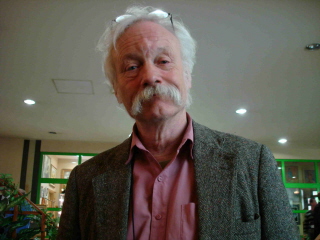
Dana Beal
Beal's supporters have begun a fundraising drive to raise the $50,000 cash bail needed to free him and to pay his legal expenses. They have set up resources online, including the Free Dana Beal
Facebook page,
web page, and
blog.
Beal and company have been charged with possession of marijuana with intent to distribute. It's not clear what the penalties for that offense are under Nebraska law, but possession of more than a pound can earn up to five years in prison and sale of any amount is punishable by a one-year mandatory minimum sentence and up to 20 years.
Beal, an erstwhile Yippie activist from the 1970s and permanent fixture on the counterculture scene, heads the New York City-based organization Cures Not Wars, which advocates for the use of ibogaine as a treatment for drug dependence. But he is more widely known for acting as an information clearing house for the annual legalization rallies held each May in more than 200 cities around the planet known as the Global Marijuana March or Million Marijuana March.
The men were traveling from California, where they had attended the annual conference of the National Organization for the Reform of Marijuana Laws (NORML) the previous week. According to local media reports, police stopped the van in which they were riding for "driving erratically," and when the police officer approached the vehicle, he saw "several bags of marijuana in plain view." He then called for assistance, and police then found multiple duffel bags of marijuana, totaling 150 pounds, throughout the vehicle.
Last year, Beal was arrested in Illinois on money-laundering charges after police there seized $150,000 in cash and a small amount of marijuana from his vehicle. The money-laundering charges were later dropped, and Beal pleaded guilty to misdemeanor marijuana possession. The state of Illinois kept the money. The Chronicle hopes that Beal, Ryan and Statzer will have similarly decent fortunes in the Nebraska system this time.
back to top
The Texas district attorney accused of participating in an egregious asset forfeiture scheme in the East Texas town of Tenaha now wants to use the very cash seized to pay for her legal defense in a federal civil rights lawsuit filed by victims of the practice. The ACLU of Texas, which, along with the national ACLU, is representing the plaintiffs in the case, filed a brief last Friday with the Texas Attorney General's office seeking to block her from doing so.
Lynda Russell is the district attorney in Shelby County, where Tenaha is located. She is accused of participating in a scheme where Tenaha police pulled over mostly African-American motorists without cause, asked them if they were carrying cash, and if they were, threaten them with being immediately jailed for money laundering or other serious crimes unless they signed over their money to authorities.
Representing a number of victims, attorneys from the ACLU of Texas and the ACLU Racial Justice Project filed a civil lawsuit in federal court in June 2008. According to the suit, more than 140 people, almost all of whom were African-American, turned over their assets to police without cause and under duress between June 2006 and June 2008. If a federal judge agrees that assets were in fact illegally seized, they should be returned to their rightful owners, whose civil rights were violated.
In one case, a mixed race couple, Jennifer Boatwright and Ronald Henderson, were stopped by a Tenaha police officer in April 2007. According to the lawsuit, they were stopped without cause, detained for some time without cause, and asked if they were carrying any cash. When they admitted they had slightly more than $6,000, a district attorney's investigator then seized it, threatening them with arrest for money laundering and the loss of their children if they refused to sign off. There was never any evidence they had committed a crime, and they were never charged with a crime.
The town mayor, the DA, the DA's investigator, the town marshal, and a town constable are all named in the lawsuit. While they claim to have acted legally under Texas asset forfeiture law, the lawsuit argues that "although they were taken under color of state law, their actions constitute abuse of authority." The suit argues that the racially discriminatory pattern of stops and searches violated both the Fourth Amendment proscription of warrantless searches and the Fourteenth Amendment's due process clause.
While either the county or the state would normally be expected to pony up for the DA's legal expenses for a lawsuit filed as a result of her performance of her duties, neither has done so. That's why Russell -- with a tin ear for irony -- requested that she be allowed to use the allegedly illegally seized money stolen from motorists. She has asked the state attorney general's office for an opinion on whether using the funds for her defense violates the state's asset forfeiture law.
"It would be completely inappropriate for the district attorney to use assets which are the very subject of litigation charging her with participating in allegedly illegal activity to defend herself against these charges," said Lisa Graybill, legal director at the ACLU of Texas. "Texas has a long history of having its law enforcement officials unconstitutionally target racial minorities in the flawed and failed war on drugs and it is of paramount importance that those officials be held accountable."
"The government must account for the misconduct of officials who operate in its name," said Vanita Gupta, staff attorney with the ACLU Racial Justice Program, who represented African-American residents of Tulia, TX in high-profile litigation challenging their wrongful convictions on drug charges. "The state of Texas has seen egregious examples of racial profiling that result from poor oversight of criminal justice officials."
The ACLU of Texas is using the Tenaha case to push for asset forfeiture reform in the Lone Star State. One such bill stalled in the state legislature this year. "The misuse of asset forfeiture laws by local officials is exacerbated by inadequate oversight," said Matt Simpson, policy strategist for the group. "The legislature must squarely address these reported civil rights violations via reform of forfeiture laws that strengthen protection against unconstitutional conduct and racial profiling."
back to top
In a Wednesday interview with the Associated Press, Russia's anti-drug chief said US and NATO anti-drug efforts in Afghanistan were "inadequate" and called for joint action to stem the flow of Afghan heroin flooding into Russia and the former Soviet republics.

anti-drug artwork, Nejat Center, Kabul (photo by Phil Smith, fall 2005)
Viktor Ivanov told the AP that he had recently urged the Obama administration to begin a program to eradicate opium poppies by spraying them with herbicides from the air. Such a program was argued for by former drug czar John Walters and others during the Bush administration, but was rejected. Earlier this year, the US announced it was shifting away from any eradication and would focus instead on interdiction, destroying drug-making facilities, and disrupting the drug trade.
Russia is burdened with rising heroin addiction rates fueled by cheap Afghan heroin, and injection drug use has been a key factor in spreading the HIV virus there. There are an estimated 2 to 2.5 million heroin addicts in Russia, with about 30,000 dying from overdoses each year.
Ivanov, a former KGB captain who served in Afghanistan during the Soviet occupation in the 1980s, complained that by abandoning eradication efforts in Afghanistan, the West was dooming Russia to a wave of heroin addiction. He also said that growing wheat and other legal crops isn't practical in the middle of a war.
"As long as the situation remains tense and the confrontation continues, no one will engage in agriculture," he said. "They won't be able to cultivate grain even if they want to."
Ivanov noted that the US continues to fund a similar program to eradicate Colombian coca plants. Manual eradication in Afghanistan has failed and will continue to fail because the West has left it to the Afghan government and local authorities lack the clout (or sometimes the will) to effectively implement it, he said.
Ivanov said he had discussed the matter with Obama drug czar Gil Kerlikowske and State Department officials during a September meeting and that both sides agreed to continue discussions on aerial eradication. "I hope that our open-minded dialogue will encourage the US to take more adequate measures," Ivanov said. "We are interested in cooperation."
back to top
What to do about marijuana cultivation and consumption is an issue that continues to fester in the South Pacific island republic of Fiji. Pot farmers have battled police to protect their crops and complained to their representatives about being harassed.

Kuata island, Fiji (CIA World Fact Book)
Consumption is high, and good citizens worry about things like
pot-smoking by elite athletes. And the Fijan police do what prohibitionist police do: destroy crops and make marijuana busts. Just a few weeks ago, police bragged about seizing
$50 million worth of weed from one popular growing region over the past five years.
Now, in the latest marijuana policy flare-up, the head of the Fiji Council of Social Services, a non-governmental organization, has called for the government to discuss legalizing marijuana. In a statement last week thanking the government for taking a dispassionate stance on whether to allow casinos on the islands, council head Hassan Khan suggested the government apply that same dispassionate stance -- without injecting religious fervor -- toward discussing marijuana legalization. Marijuana sales could provide revenue for Fiji, he said.
It already provides an income for many families on the islands. A school principal bemoaning pot-smoking by students said that marijuana farming supported most of his students' families. "It's their livelihood, so the children will see it from there," he said.
Khan's comments, as mild as they were, excited an outraged reaction from at least one Fijian blogger. "Bloggers, well now you have Hassan Khan, the Director for Human Services openly advocating for the lawful sale of marijuana to provide extra revenue for Fiji!" warned a blogger known as "Free Fiji." "He should be ashamed of himself and resign! I ask Khan, apart from his short sighted revenue making, what will it cost the tax payers of Fiji in terms of social and cultural denigration? Khan would not even dare saying the same thing in India or Pakistan. I cannot help but suspect some sinister motive to decimate the Fijian race and this kind of open advocating of legalizing an illegal substance, which is illegal in most part of the world is truly shocking. I like to challenge you 'silent ones' do you continue to pretend all is okay in the heartland, where people in positions of responsibilities openly advocating the potential sale of marijuana or are you too stoned out of your head to think clearly?"
And so go the cannabis culture wars in the South Pacific.
back to top
October 14, 1970: President Nixon spearheads the Controlled Substances Act (CSA), legislation establishing today's "schedules" as a means of classifying drugs strictly by their medical value and potential for abuse. In practice the science drug scheduling has often yielded to drug war politics, however.
October 12, 1984: The Comprehensive Crime Control Act becomes law, establishing federal "mandatory minimum" sentencing guidelines eliminating judges' discretion when handing down prison terms. Over the next two years drug sentences increase by 71% nationwide.
October 15, 1986: Assistant Attorney General Mark Richard testifies before the Kerry Committee that he had attended a meeting with 20 to 25 officials and that the DEA did not want to provide any of the information the committee had requested on the involvement of US-backed Nicaraguan Contra rebels in drug trafficking.
October 13, 1999: In a series of raids named "Operation Millennium," law enforcement in Mexico, Colombia, and Ecuador arrest 31 persons for drug trafficking, including Colombian cartel leader Fabio Ochoa. Ochoa is indicted in a Ft. Lauderdale court for importing cocaine into the US, which requests his extradition in December 1999.
October 13, 1999: Governor of New Mexico Gary Johnson is quoted by the Boston Globe: "Make drugs a controlled substance like alcohol. Legalize it, control it, regulate it, tax it. If you legalize it, we might actually have a healthier society."
October 9, 2000: PBS begins a special two-day program entitled "Drug Wars." The series examines America's ceaseless efforts over the past three decades to stop the flow of illegal drugs into the country, and shows how the drug war wastes hundreds of billions of dollars, alters the criminal justice system, puts millions of people in jail, and allows organized crime to thrive.
October 10, 2002: Drug Czar John Walters travels to Las Vegas, Nevada and begins two days of making appearances around the state illegally lobbying against Question 9, a proposal to amend the state constitution by making the possession of three ounces or less of marijuana legal for adults. The measure is defeated at the polls the following month.
October 14, 2003: Supreme Court justices reject the Clinton administration's request, continued by the Bush administration, to consider whether the federal government can punish doctors for recommending or even discussing the use of marijuana for their patients. The decision by the High Court clears the way for state laws allowing ill patients to smoke marijuana if a doctor recommends it.
October 14, 2003: At Emory University Law School former President Jimmy Carter says, "All three of my boys smoked pot. I knew it. But I also knew if one was caught he would never go to prison. But if any of my [black] neighbors got caught, they would go to prison for ten, twelve years. No law school has had the temerity to look at what is fundamentally wrong with our legal system, which discriminates against the poor."
back to top
StoptheDrugWar.org (DRCNet) is pleased to be a partner in the upcoming 2009 International Drug Policy Reform Conference, this November 12-14 at the Hyatt Regency in Albuquerque, New Mexico.
The Reform Conference, sponsored by our friends at the Drug Policy Alliance, is the major biennial gathering of drug policy reformers of all kinds. The last one, held in New Orleans in 2007, brought together over 1,000 attendees representing 25 different countries. This year attendees will have the opportunity to spend three days interacting with people committed to finding alternatives to the war on drugs while participating in sessions given by leading experts from around the world. Click here to register -- early bird rates are available through October 9, and discounts are available for students and New Mexico residents.
Some testimonials from the 2007 conference:
"The conference was a tremendous educational experience. I established tons of contacts and look forward to a future dedicated to fighting the drug war."
"Lots of great energy! This was my very first conference and I would most definitely recommend it to any health care professional desiring information on this subject. The speakers were very educated on their subjects and readily available to answer questions."
"This conference has been an incredible experience. The level of knowledge and experience from the presenters has been fantastic."
"I thought the conference was a wonderful collaboration of minds and knowledge on the multiple aspects of drug policy. I enjoyed having applicable speakers on both sides of the debate of policy and drug reform."
"This conference exceeded my expectations in every way possible. As a first year attendee I had no idea what I would learn."
"Once again, thank you for the most exciting and informative conference in the world."
Hope to see you there.
back to top
Along with our weekly in-depth Chronicle reporting, DRCNet also provides daily content in the way of blogging in the Stop the Drug War Speakeasy -- huge numbers of people have been reading it recently -- as well as Latest News links (upper right-hand corner of most web pages), event listings (lower right-hand corner) and other info. Check out DRCNet every day to stay on top of the drug reform game! Check out the Speakeasy main page at http://stopthedrugwar.org/speakeasy.

prohibition-era beer raid, Washington, DC (Library of Congress)
Since last issue:
Scott Morgan writes: "Drug Czar's Office Reevaluating Marijuana Policy: 'We're trying to base stuff on the facts,'" "Washington Post Punches Marijuana Prohibition in the Teeth," "Irony Alert: Drug Czar Complains About Media Bias," "A Lesson in Etiquette for Drug Policy Activists."
David Borden offers: "1000 Feet from Everywhere," "Hearings on Massachusetts 'Tax and Regulate' Bill in Boston Next Week," "New York Rockefeller Drug Law Reforms Go Into Effect Today."
David Guard posts numerous press releases, action alerts and other organizational announcements in the In the Trenches blog.
Again, http://stopthedrugwar.org/speakeasy is the online place to stay in the loop for the fight to stop the war on drugs. Thanks for reading, and please join us on the comment boards.
back to top
Want to help end the "war on drugs," while earning college credit too? Apply for a StoptheDrugWar.org (DRCNet) internship for this summer or fall semester and you could come join the team and help us fight the fight!
StoptheDrugWar has a strong record of providing substantive work experience to our interns -- you won't spend the summer doing filing or running errands, you will play an integral role in one or more of our exciting programs. Options for work you can do with us include coalition outreach as part of the campaign to rein in the use of SWAT teams, to expand our work to repeal the drug provision of the Higher Education Act to encompass other bad drug laws like the similar provisions in welfare and public housing law; blogosphere/web outreach; media research and outreach; web site work (research, writing, technical); possibly other areas. If you are chosen for an internship, we will strive to match your interests and abilities to whichever area is the best fit for you.
While our internships are unpaid, we will reimburse you for metro fare, and DRCNet is a fun and rewarding place to work. To apply, please send your resume to David Guard at [email protected], and feel free to contact us at (202) 293-8340. We hope to hear from you! Check out our web site at http://stopthedrugwar.org to learn more about our organization.
back to top











